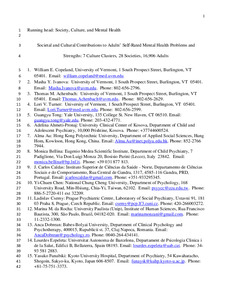Por favor, use este identificador para citar o enlazar este ítem:
https://repositorio.uca.edu.ar/handle/123456789/16956| Título: | Cultural contributions to adults' self-rated mental health problems and strengths: 7 culture clusters, 28 societies, 16 906 adults | Autor: | Copeland, William E. Ivanova, Masha Y. Achenbach, Thomas M. Turner, Lori V. Tong, Guangyu Ahmeti Pronaj, Adelina Au, Alma Bellina, Mónica Caldas, J. Carlos Chen, Yi Chuen Csemy, Ladislav da Rocha, Marina M. Dobrean, Anca Ezpeleta, Lourdes Funabiki, Yasuko Harder, Valerie S. Lecannelier, Felipe Cabada, Marie Leiner de la Leung, Patrick Liu, Jianghong Mahr, Safia Malykh, Sergey Marković, Jasminka Ndetei, David M. Oh, Kyung Ja Petot, Jean Michel Riad, Geylan Sakarya, Direnc Samaniego, Virginia C. Sebre, Sandra Shahini, Mimoza Silvares, Edwiges Ferreira de Mattos Šimulionienė, Roma Sokoli, Elvisa Talcott, Joel B. Vázquez, Natalia Wolanczyk, Tomasz Zasępa, Ewa |
Palabras clave: | PSICOPATOLOGIA; SINDROME; SALUD MENTAL; ADULTOS | Fecha de publicación: | 2023 | Editorial: | Cambridge University Press | Cita: | Copeland, W. E. et al... Cultural contributions to adults' self-rated mental health problems and strengths: 7 culture clusters, 28 societies, 16 906 adults [en línea]. Postprint de artículo publicado en Psychological Medicine, 2023 doi:10.1017/S0033291723001332. Disponible en: https://repositorio.uca.edu.ar/handle/123456789/16956 | Resumen: | Abstract: Background It is unknown how much variation in adult mental health problems is associated with differences between societal/cultural groups, over and above differences between individuals. Methods To test these relative contributions, a consortium of indigenous researchers collected Adult Self-Report (ASR) ratings from 16 906 18- to 59-year-olds in 28 societies that represented seven culture clusters identified in the Global Leadership and Organizational Behavioral Effectiveness study (e.g. Confucian, Anglo). The ASR is scored on 17 problem scales, plus a personal strengths scale. Hierarchical linear modeling estimated variance accounted for by individual differences (including measurement error), society, and culture cluster. Multi-level analyses of covariance tested age and gender effects. Results Across the 17 problem scales, the variance accounted for by individual differences ranged from 80.3% for DSM-oriented anxiety problems to 95.2% for DSM-oriented avoidant personality (mean = 90.7%); by society: 3.2% for DSM-oriented somatic problems to 8.0% for DSM-oriented anxiety problems (mean = 6.3%); and by culture cluster: 0.0% for DSM-oriented avoidant personality to 11.6% for DSM-oriented anxiety problems (mean = 3.0%). For strengths, individual differences accounted for 80.8% of variance, societal differences 10.5%, and cultural differences 8.7%. Age and gender had very small effects. Conclusions Overall, adults' self-ratings of mental health problems and strengths were associated much more with individual differences than societal/cultural differences, although this varied across scales. These findings support cross-cultural use of standardized measures to assess mental health problems, but urge caution in assessment of personal strengths. | URI: | https://repositorio.uca.edu.ar/handle/123456789/16956 | ISSN: | 0033-2917 (Impreso) 1469-8978 (online) |
Disciplina: | PSICOLOGIA | DOI: | 10.1017/S0033291723001332 | Derechos: | Acceso abierto | Fuente: | Psychological Medicine, 2023 |
| Aparece en las colecciones: | Artículos |
Ficheros en este ítem:
| Fichero | Descripción | Tamaño | Formato | |
|---|---|---|---|---|
| societal-cultural-contributions.pdf | 364,29 kB | Adobe PDF |  Visualizar/Abrir |
Visualizaciones de página(s)
49
comprobado en 27-abr-2024
Descarga(s)
12
comprobado en 27-abr-2024
Google ScholarTM
Ver en Google Scholar
Altmetric
Altmetric
Este ítem está sujeto a una Licencia Creative Commons

